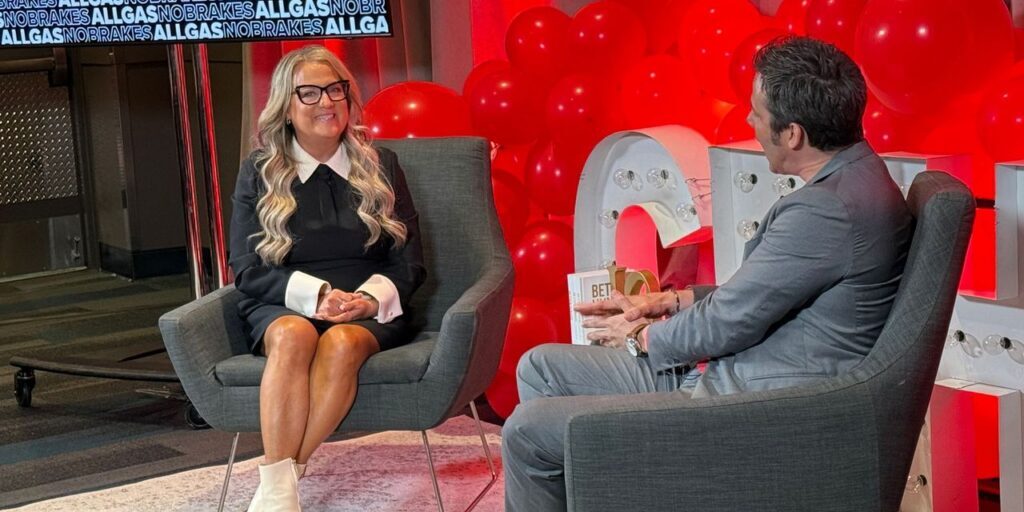When Elizabeth Hurley was in college in Chicago, she worked as a waitress at my favorite pizza place in the world, Giordano’s, slinging deep-dish pizzas — and also taking great care of customers and making lots of conversation.
Her ease in connecting with customers prompted many people to suggest that Elizabeth go into sales. She followed that advice, and now she’s taking great care of customers as the vice president of residential sales at Tarkett, one of the world’s leading flooring manufacturers.
That journey is something Elizabeth and I have in common. I cut my teeth waiting tables at Mama Rosa’s Italian restaurant, and to this day, I believe that service experience provided way more real-world readiness than my four years of college. Her presentation at the 2019 Tarkett SKO really resonated with me, and I followed up for a deeper dive on her unique approach to leading a high performing sales team.
A Fresh Take on Accountability
Core to Elizabeth’s sales leadership philosophy is an emphasis on creating a culture of accountability, and she says leaders have to model the behavior they expect from their employees. “I think that when you work, you show up and get the job done — and when you leave, you have to show your team that’s what you are willing to do every day,” she says.
But accountability in sales is about more than just going first, Elizabeth says. In fact, it’s about even more than owning your mistakes and getting your work done on time. It’s also about owning your successes and building upon them.
It’s not the first way we think about accountability, but to Elizabeth, it’s essential — and an opinion informed by personal experience. “I think that women, especially, tend to not honk their own horns,” she says. “I remember somebody telling me 20 years ago, ‘If you don’t honk your own horn nobody else will hear you coming.’ ”
Hiring for Healthy Self-Confidence
Elizabeth hasn’t sought to create a winning sales culture just by imposing her will from the top down. She has also brought her emphasis on a culture of accountability to her hiring practices.
But how do you screen for accountability? By looking for self-confidence. That’s why when Elizabeth evaluates candidates to join her sales team, she asks herself whether a particular candidate is “leading themselves in what they do.”
In other words, she’s looking for people who are intelligent, reliable and self-confident — but not arrogant. Yes, they perform and take pride in those accomplishments, but they’re also playing for the overall benefit of the team.
Most importantly, they are self-aware. They know themselves, Great salespeople have to be able to answer two questions, Elizabeth says: “Do I know who I am? Do I know what I do?”
It also helps to know why. When you find the why, you can endure any how.
These aren’t always easy questions to answer. Having self-awareness means not just knowing our strengths, but also our weaknesses. It means taking the time to do the inner work needed to be your best self — and bring the best value you can to your organization. Finding the time to ground yourself and be present in the moment is essential to connecting with customers and helping guide them to make the best decisions.
The Human Factor
The best salespeople, Elizabeth says, don’t view a sales relationship through a transactional lens. Instead, they view their relationship with a customer as exactly that: a relationship. These winning salespeople are consultants who get closer to the customer and strive to understand their needs first. “The better salespeople have empathy,” she says. “They care and want to know more about what’s happening in your business so that they can bring the right product and ultimately more value to you.”
This ability to own customer outcomes as your own is a powerful differentiator for salespeople who are competing with the demands of the 2025 economy. It’s easy for customers to go online and comparison shop and research. With more businesses moving online to make the buy, it’s more important than ever for salespeople to demonstrate that they have the expertise to guide customers through a purchase decision. “We have to show ourselves ‘what is the value of coming to me as opposed to a website?’ ” Elizabeth says. “And the difference is that human factor.”
That human factor is how you add value that is worth even more than the convenience of buying online. People crave human interaction, but you have to earn it by adding value at each and every interaction.
For Elizabeth, it means reminding her sales team to ask themselves this critical question every day: “What am I going to do to make this company better?”










